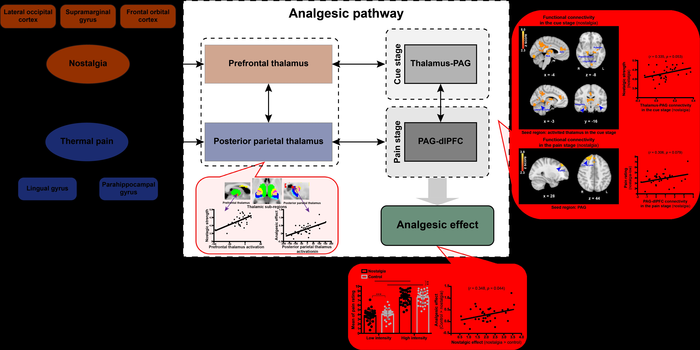Ever noticed that looking at photos of good times with family or friends diminishes the pain of your headache? Nostalgia has already been shown to be helpful with pain relief, and a new study has now revealed the thalamocortical mechanism for nostalgia-induced analgesia.

Credit: Institute of Psychology
Ever noticed that looking at photos of good times with family or friends diminishes the pain of your headache? Nostalgia has already been shown to be helpful with pain relief, and a new study has now revealed the thalamocortical mechanism for nostalgia-induced analgesia.
Led by Dr. KONG Yazhuo from the Institute of Psychology of the Chinese Academy of Sciences, the research team found that the thalamus, a critical brain region for pain modulation, is also related to the analgesic effect associated with nostalgia.
Nostalgia, a sentimental longing for one’s past, is a self-conscious, perhaps bittersweet but predominantly positive social emotion. Nostalgia helps us maintain a positive psychological status when counteracting the negative impact of difficult situations. The adaptive functions of nostalgia are many, with one effect being pain relief.
In the current study, a nostalgia-related functional MRI paradigm (i.e., nostalgia vs. control cues when people were viewing pictures) was combined with heat-pain stimulation (i.e., low heat vs. high heat when people were feeling pain) to examine how brain responses elicited by pain stimulation were modulated after people experienced nostalgic emotion.
After observing triggers of childhood memories, participants reported experiencing weaker feelings of pain in response to the thermal stimuli, particularly at low stimulus intensities.
Most importantly, the anterior thalamus encoded nostalgia, and the posterior parietal thalamus encoded pain perception. Anterior thalamic activation can predict posterior parietal thalamus activation. “The thalamus plays a key role as a central functional linkage in the analgesic effect,” said Dr. ZHANG Ming, first author of the study.
When people were looking at pictures, the strength of the nostalgia they experienced was also strongly associated with connectivity between the thalamus and the periaqueductal gray (PAG), an area of gray matter found in the midbrain. In this situation, coupling between PAG and the dorsal-lateral prefrontal cortex predicted pain perception when people were feeling pain. This indicates that the thalamus modulates nociceptive inputs and plays a crucial role in triggering the brain-stem analgesic pathway.
Sometimes people experience mild clinical pain that’s uncomfortable, but not enough to require medication. In these cases, non-drug analgesic pain relief methods can be helpful or even necessary.
This study sheds light on the neural mechanisms underlying nostalgia-induced pain relief, providing novel insights into the further development and improvement of non-drug, psychological analgesia.
This work was published in the Journal of Neuroscience on Feb. 28 and was funded by the National Natural Science Foundation of China and the National Social Science Fund of China.
DOI
10.1523/JNEUROSCI.2123-21.2022




